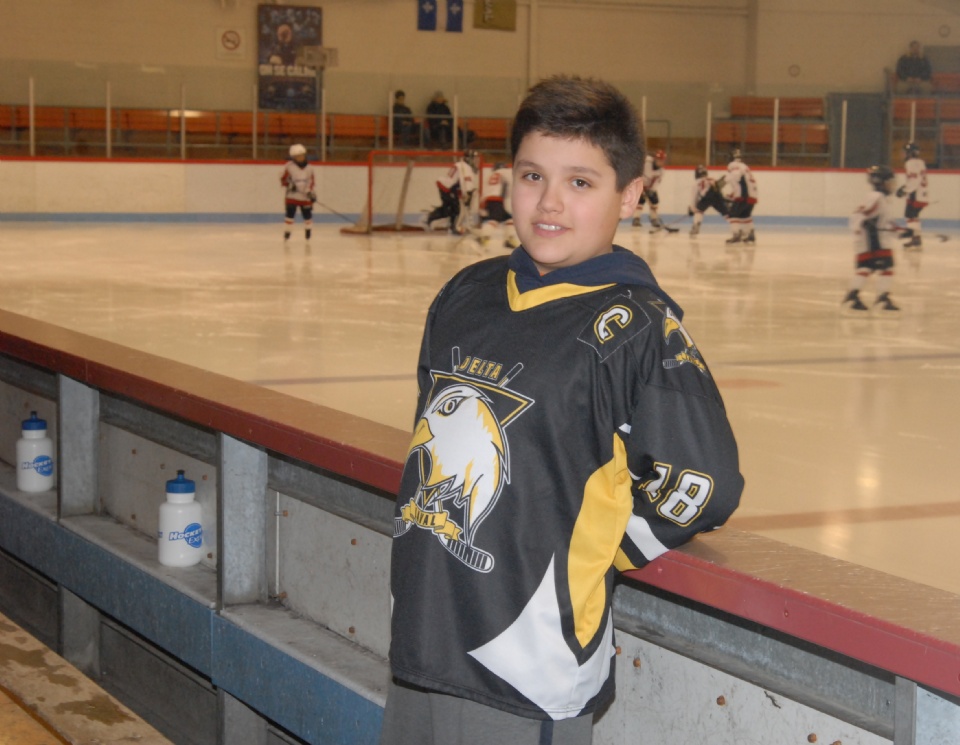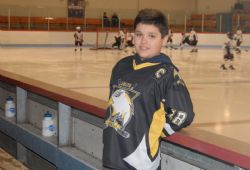As a parent you expect your child to be active, healthy, and full of
life but, what if life throws you a curve ball? That was the case for Zachary
Rose and his parents.
11-year old Zachary used to be the captain of his hockey team until
December 2013 when his doctor gave him devastating news; he couldn’t play
hockey anymore.
Zach
was diagnosed with Hypertrophic cardiomyopathy
(HCM), a primary disease of the myocardium (the muscle of the heart) in which a
portion of the myocardium is hypertrophied
(thickened) without any obvious cause. This leads to stiffening of the walls
of the heart and abnormal aortic and mitral heart valve function, both of which
may impede normal blood flow out of the heart.
Jeff, Zach’s father was angry when they first got the diagnosis. He said
they found out by chance; it took a couple of years before they actually found
out what Zach had. At first he was diagnosed with a heart murmur. After the initial
test, they waited for an answer and never heard from the physician, so they
assumed everything was fine. A year later they went back to the doctor and, once
again, they were left in limbo. The Roses then assumed Zach was fine. Finally,
the doctor recommended they see a cardiologist after she heard the murmur. It
took six months to get an appointment. Indeed, the ultrasound showed a
thickening of the ventricle and the heart was enlarged in one spot.
When I asked Zach if
he had noticed something different in his performance, he said he knew something
was not right but didn’t pay attention to his shortness of breath and the
sporadic chest pain.
Right after the
diagnosis, Zach’s parents became hypersensitive trying to protect their son.
Even Zach’s twin sister became vigilant.
“My sister looks after me. She’s a good sister,” Zach said. “She’ll
tell me when I’m about to do something I am not supposed to do and she’d say, ‘Zach,
don’t do that!’” He then joked that he gets away with a lot of stuff now.
Many people with HCM have no symptoms or only minor
symptoms, and live a normal life. Other people develop symptoms, which progress
and worsen as heart function worsens.
Symptoms of HCM can occur at any age and may include;
Chest pain or
pressure (occurs usually with exercise or
physical activity, but can also occur with rest or after meals)
Shortness
of breath (dyspnea)
especially with exertion
Fatigue
(feeling overly tired)
Fainting (caused by irregular heart rhythms,
abnormal responses of the blood vessels during exercise, or no cause may be
found)
Palpitations
(fluttering in the chest) due to abnormal heart rhythms (arrhythmias), such as atrial fibrillation
or ventricular tachycardia
Sudden
death (occurs in a small
number of patients with HCM)
Zach explained that one in
every thousand people have HCM and is not as uncommon. I was pleasantly
surprised to see how well-informed Zach is. Jeff says they have been learning
more about the disease and, especially Zach who is really involved and asks a
lot of questions every time he sees his doctor.
The doctor informed them that HCM is
genetic and, although neither of Zach’s parents have it, they believe someone
in their family gene pool carry the gene. HCM can run in
families, but the condition may also be acquired as a part of aging or high blood pressure. In other instances,
the cause is unknown.
Zach’s going for
genetic testing to create a profile and take a sample from his sister. They’ll
match it up to see if she’s a carrier. For now, they’re just waiting for the
geneticist.
In the meantime, Zach
had to stop playing any contact sports, any sports where he overexerts himself,
and any sports where he can be hit on the chest. Therefore, soccer, football
and hockey are out the question. Jeff added that this is the same disease that
afflicts some athletes where they would die suddenly on the ice or on the field.
However, those cases were never diagnosed. Fortunately for Zach, he was
diagnosed early on and he’s constantly being followed up by ultrasounds and medical
supervision.
Since the diagnosis,
Zach’s lifestyle has changed but that doesn’t deter him from being a happy kid
and enjoying sports. After a lot of discussion with his dad, Zach agreed to
take on golf. He just started
playing and so far he really enjoys it because is something he can do all
year round. He is also allowed to do some cycling, archery, and bowling, which he’s
really good at. There’s a lot he can still do.
Doctors usually recommend certain lifestyle changes such as;
- Diet. Drinking at least six to eight, 8-ounce glasses of water a day is important, unless fluids are restricted. In hot weather, you should increase your fluid intake. Fluid and salt restrictions may be necessary for some patients if heart failure symptoms are present. Ask your doctor about specific fluid and dietary guidelines, including information about alcoholic beverages and caffeinated products.
- Exercise. Your doctor will tell you if you may exercise or not. Most people with cardiomyopathy are able to do non-competitive aerobic exercise. However, your doctor may ask you not to exercise, based on your symptoms and the severity of your disease. Heavy weight lifting is not recommended.
- Regular follow-up visits. Patients with HCM should have an annual follow-up visit with their cardiologist to monitor their condition. Follow-up appointments may be more frequent when HCM is first diagnosed.
Zach was used to being on the ice afterschool and he had to adjust to not doing those things anymore. According to the doctor, he can do light jogging. It is more of a lifestyle adjustment and lucky for him, there’s no diet change. “We’ll take it one day at a time, but right now we’re praying it doesn't progress,” said Jeff.
For Jeff, it’s important to share Zach’s story because his son has been involved in sports since he was three or four years old and he’s still passionate about sports. They just had to make some adjustments so that Zach could continue enjoying his active childhood. At the beginning Zach felt he was alienated by his friends, not because they didn't want to hang out with him but, because they were doing things he couldn't do. Zach went through a period in school where he was hanging out by himself because his friends were doing sports he couldn't practice anymore. But now he has a new group of friends who do different things. Zach is still Zach.
Once he goes to secondary school, he’ll take music instead of gym classes. He’ll join a very good music program and that includes piano for two years.
“Over the past six months, we had to change our way of thinking so we’re coming with new ideas every day and hopefully everything will stay the same,” Jeff said.
Zach has been treated at Montreal Children’s Hospital and the head of the cardiology department is in charge of Zach’s case. His doctor explained they make a group decision on their patients; the ultimate outcome is decided by a group of doctors. Every decision made on Zach’s case went to a board; they all sat down and went through the findings of the ultrasounds, ECGs, X-rays and the decisions on the medication and the course of action. “We felt a little more comfortable when we learned this,” Jeff added.
When I asked Zach what he’d like to achieve, he smiled and said, “Maybe next year if I’m still into golf, instead of summer camp, we’ll get a membership at a golf club. My dad said he’ll try to put me into some competitions.”
As it is a normal reaction from an 11-year-old child, “Zach was upset at the world for a while and wasn't a Continue reading below... Happy Camper,” Jeff shared. “But he’s a happy kid now. If he wants to try something, we’ll talk with the doctor first and get his approval.”
By telling Zach’s story, Jeff wants other parents to be aware; it’s a disease that is not going to show itself until the worst possible time. “If your doctor finds or sees something, don’t discard it. It could make a difference between a happy life and a tough one.”
On his part, Zach has taken it upon himself to spread the message about his disease whenever he gets a chance (i.e. every person he comes in contact with). “The disease is not stopping him either. He’s a better person for it, for sure.” Jeff added.
After having gone through all this, Jeff would like other parents to be supportive of their children as he stated, “Let him go through it…. they just have to adjust. They need their grieving process.” Jeff has also sought guidance from forums and support groups on social media. There’s a whole society for Hypertrophic cardiomyopathy that includes patients of all ages and parents alike. Jeff is part of the group and he receives updates, articles, and breakthroughs. “You have to do what the doctor says. Take the time to feel sorry for yourself but let him know you’ll be there for him. Educate yourself on the disease.”
Zach also had a message for his peers; “If a kid has what I have, there’s other stuff you can do. There’s jogging, swimming, biking life doesn't revolve around hockey. I just want to bring awareness to the disease…. If your heart hurts, or have shortness of breath, bring it to the doctor. Don’t take chances.”
When I asked him what advice he’d give kids feeling sorry for themselves, Zach said assertively, “You will be frustrated but you’re gonna have to sometime get over it. You can’t sit in a little corner and cry all the time. Take a minute to feel bad for yourself but move on.”
The message is life doesn't have to stop.

 In The Latest Issue:
In The Latest Issue:


 BY:
BY: 

Tweet
Share